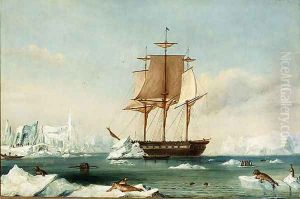Captain Charles Wilkes Paintings
Captain Charles Wilkes was not an artist in the traditional sense of painters or sculptors, but rather a distinguished officer in the United States Navy who made significant contributions to naval science and exploration, akin to the artistry of discovery. Born on April 3, 1798, in New York City, Wilkes embarked on a career that would make him a notable figure in the annals of American maritime history. His most significant achievement came as the leader of the United States Exploring Expedition, also known as the Wilkes Expedition, which took place from 1838 to 1842. This expedition was the first United States exploring and surveying voyage of substantial magnitude into the Pacific Ocean and surrounding areas, and it marked a monumental moment in the expansion and development of scientific knowledge, naval power, and mapping.
Wilkes's early career in the navy began after he entered service in 1818, showing early on a keen interest in the sciences, particularly in the fields of navigation and hydrography. By the time he was appointed as the commander of the Exploring Expedition, he had already made significant strides in these areas. The expedition itself was an ambitious undertaking, involving a squadron of ships and covering regions including the South Pacific, the Antarctic, and the Pacific Northwest, among others. Through the course of this voyage, Wilkes and his team collected a vast array of specimens in natural history, charted numerous islands and coastlines, and notably claimed the discovery of the continent of Antarctica for the United States.
Despite the successes of the expedition, Wilkes's leadership style and the disciplinary measures he employed were often sources of controversy. His strict command and the harsh punishments he meted out led to several disciplinary issues and mutinies during the voyage. These issues, along with disputes over his claims of discovering Antarctica, clouded his return to the United States. However, the scientific contributions of the expedition were undeniable, leading to vast improvements in nautical charts, the enrichment of American museums with new natural specimens, and significant contributions to the scientific literature of the time.
Wilkes's later career included serving in the American Civil War, where he gained further notoriety for the Trent Affair, an international diplomatic incident that he precipitated in 1861 by unlawfully capturing two Confederate envoys from a British ship. After the war, he continued his scientific pursuits and worked on compiling the results of his expedition, contributing to the foundation of the Smithsonian Institution's collections.
Captain Charles Wilkes died on February 8, 1877, in Washington, D.C. His legacy, marked by his contributions to exploration, science, and the navy, remains a significant chapter in the history of American maritime and scientific endeavors. Though his career was not without controversy, his impact on naval exploration and the advancement of scientific knowledge is undeniable.
